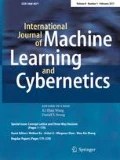Abstract
The theory of concept lattice proposed by Wille has been generalized in three different ways based on binary formal contexts, and substantive properties with respect to these formal concepts have been derived. In this paper, we study a reverse problem, that is, how to characterize the notions of formal concepts in terms of their properties. Axiomatic characterizations for the theory of formal concept analysis are presented. By this approach, four types of conceptual knowledge system are defined, and axiom sets that must be satisfied by the conceptual knowledge system are stated. It is proved that axioms of the conceptual knowledge system guarantee the existence of certain types of binary relations producing the same formal concepts. The independence of axiom sets characterizing the conceptual knowledge system is examined.




Similar content being viewed by others
References
Alcalde C, Burusco A, Fuentes-González R, Zubia I (2009) Treatment of L-fuzzy contexts with absent values. Inf Sci 179:1–15
Belohlavek R (2004) Concept lattices and order in fuzzy logic. Ann Pure Appl Logic 128 (1–3):277–298
Burusco A, Fuentes-Gonzales R (1994) The study of the L-fuzzy concept lattice. Math Soft Comput I 3:209–218
Düntsch I, Gediga G (2002) Modal-style operators in qualitative data analysis. In: Proceedings of the 2002 IEEE international conference on data mining, pp 155–162
Ganter B, Wille R (1999) Formal concept analysis, mathematical foundations. Springer, New York
Hu K, Sui Y, Lu Y, Wang J, Shi C (2001) Concept approximation in concept lattice. In: Knowledge discovery and data mining. Proceedings of 5th Pacific–Asia conference, PAKDD’01. Lecture Notes in Computer Science, vol 2035, pp 167–173
Kent RE (1996) Rough concept analysis: a synthesis of rough sets and formal concept analysis. Fundam Inf 27:169–181
Liu M, Shao MW, Zhang WX, Wu C (2007) Reduction method for concept lattices based on rough set theory and its application. Comput Math Appl 53:1390–1410
Liu GL (2008) Axiomatic systems for rough sets and fuzzy rough sets. Int J Approx Reason 48:857–867
Ma JM (2007) The mathematical characterizations of some models on rough set and concept lattice, Ph.D. Dissertation. Xi’an Jiaotong University (in Chinese)
Morsi NN, Yakout MM (1998) Axiomatics for fuzzy rough set. Fuzzy Sets Syst 100:327–342
Pawlak Z (1982) Rough sets. Int J Comput Inf Sci 11:341–356
Pawlak Z, Skowron A (2007) Rough sets and Boolean reasoning. Inf Sci 177:41–73
Saquer J, Deogun JS (2001) Concept approximations based on rough sets and similarity measures. Int J Appl Math Comput Sci 11(3):655–674
Saquer J, Deogun JS (1999) Formal rough concept analysis. In: Zhong N, Skowron A, Ohsuga S (eds) The 7th international conference on new directions in rough sets, data mining, and granular-soft computing (RSFDGrC99). Lecture Notes in Computer Science, vol 1711. Springer, Berlin, pp 91–99
Shao MW, Zhang WX (2005) Approximation in formal concept analysis. In: Slezak D, Yao JT, Peters JF et al (eds) The 10th international conference on rough sets, fuzzy sets, data mining, and granular computing (RSFDGrC 2005). Lecture Notes in Artificial Intelligence, vol 3641. Springer, Berlin, pp 43–53
Thiele H (2000) On axiomatic characterisations of crisp approximation operators. Inf Sci 129:221–226
Thiele H (2001) On axiomatic characterisation of fuzzy approximation operators I, the fuzzy rough set based case. In: RSCTC 2000, Lecture Notes in Computer Science, vol 2005. Springer, Berlin, pp 239–247
Wang X-Z, Zhai J-H, Lu S-X (2008) Induction of multiple fuzzy decision trees based on rough set technique. Inf Sci 178(16):3188–3202
Wang X-Z, Tsang E, Zhao S-Y, Chen D-G, Yeung D (2007) Learning fuzzy rules from fuzzy examples based on rough set techniques. Inf Sci 177(20):4493–4514
Wille R (1982) Restructuring lattice theory: an approach based on hierarchies of concepts. In: Rival I (ed) Ordered sets. Reidel, Dordrecht, pp 445–470
Wu WZ, Zhang WX (2004) Constructive and axiomatic approaches of fuzzy approximation operators. Inf Sci 159:233–254
Yang XB, Song X, Chen Z, Yang J (2011) On multigranulation rough sets in incomplete information system. Int J Mach Learn Cybern
Yang XP, Li TJ (2006) The minimization of axiom sets characterizing generalized approximation operators. Inf Sci 176:887–899
Yao YY (2004) Concept lattices in rough set theory. In: Proceedings of 23rd international meeting of the North American Fuzzy Information Processing Society, pp 796–801
Yao YY (2004) A comparative study of formal concept analysis and rough set theory in data analysis. In: Proceedings of 3rd international conference, RSCTC’04, pp 59–68
Yao YY (2004) Rough set approximations in formal concept analysis. In: Proceedings of 2004 annual meeting of the North American Fuzzy Information Processing Society, pp 73–78
Yao YY (1998) Constructive and algebraic methods of the theory of rough sets. J Inf Sci 109:21–47
Zhang WX, Ma JM, Fan SQ (2007) Variable threshold concept lattices. Inf Sci 157:3177–3187
Zhang WX, Qiu GF (2005) Uncertain decision making based on rough set. Tsinghua University Press, Beijing (in Chinese)
Zhang WX, Wei L, Qi JJ (2005) Attribute reduction theory and approach to concept lattice. Sci China Ser F Inf Sci 48(6):713–726
Zhu W, Wang S (2011) Matroidal approaches to generalized rough sets based on relations. Int J Mach Learn Cybern 2(4):273–279
Acknowledgments
This work was supported by grants from the National Natural Science Foundation of China (No. 61005042) and Scientific Research Program Funded by Shaanxi Provincial Education Department (Program No. 09JK811).
Author information
Authors and Affiliations
Corresponding author
Rights and permissions
About this article
Cite this article
Song, XX., Wang, X. & Zhang, WX. Independence of axiom sets characterizing formal concepts. Int. J. Mach. Learn. & Cyber. 4, 459–468 (2013). https://doi.org/10.1007/s13042-012-0110-z
Received:
Accepted:
Published:
Issue Date:
DOI: https://doi.org/10.1007/s13042-012-0110-z




